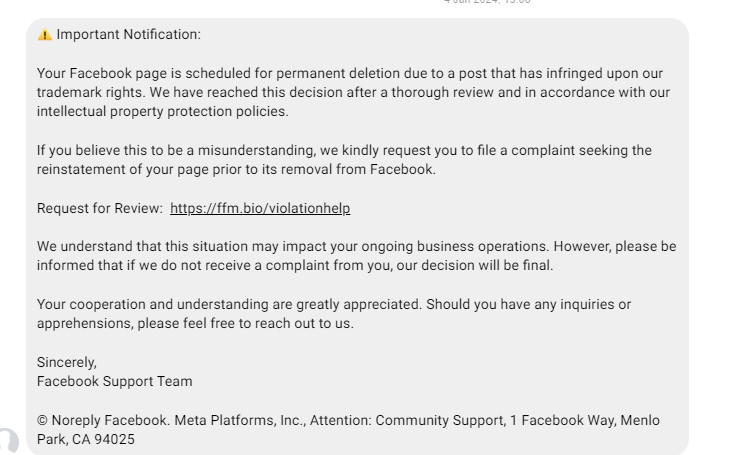In recent weeks, an alarming surge of scams, particularly the Meta Business Support scam, has targeted Facebook business and community page owners. As scammers impersonate Meta, users are at risk of falling victim to deceptive messages leading to potential phishing threats. This article aims to equip you with the necessary information to recognise and avoid such scams, ensuring a secure online experience.
The Meta Business Support Messenger Scam
Scammers employ deceptive messages, claiming affiliation with Meta, to target Facebook business and community page owners. These fraudulent messages falsely assert that pages are disabled due to a report by I.N.C. International Concepts, a legitimate women’s clothing brand unrelated to the scam. The scammers create a false sense of urgency, urging users to click on a link under the guise of addressing the alleged issue.
Identifying the Scam
Several variations of the Meta Business Support scam exist, all with the same goal.
Example of a Phishing Message sent to a business page:

Some Scam URL Examples:
Please note these are only some of the links that have been reported. Clicking on any of these links is a guaranteed encounter with a scam, so it’s crucial to steer clear.
- Mfb[.]mobi
- mfb[.]social
- facebook[.]5246272198633275-pages[.]help/[.]com
- ampl.ink/MetaBusinessSupportwwcom
Facebook Page Deletion Phishing Scams
In a related threat, scammers have been sending messages claiming that Facebook pages are scheduled for permanent deletion due to trademark infringement. The message invites users to file a complaint to prevent the deletion. However, this is a phishing scam aimed at stealing login credentials and personal information.
Protect yourself and your business by staying informed and vigilant against evolving scams in the digital landscape. Remember, a cautious approach is the first line of defence against cyber threats.
How to Stay Safe from Scams
Given the increasing sophistication of scams, it’s essential to adopt proactive measures to protect yourself:
- Verify Web Addresses: Legitimate Facebook pages always start with ‘facebook.com/.’ Ensure you’re on official pages before taking any action.
- Direct Communication: When seeking assistance, use official channels. Avoid clicking on links provided by others; instead, search for the Facebook Help Center and visit the site directly.
- Protect Personal Information: Exercise caution with your personal information. Refrain from sharing sensitive details online.
- Avoid Unknown Links: Never click on links from unknown sources. Verify the legitimacy of links before taking any action.
Reporting Scams
To report a scam group, page, or profile on Facebook, select the three dots on the right-hand side of the page and click ‘report.’ Additionally, you can move the scam phishing messages to the spam folder when received. Report scam websites to the National Cyber Security Centre on its website.
Facebook Help Center Tips and Tools
Facebook’s Help Center provides essential information to enhance your online safety:
- Reporting Scams: If you suspect a scam on Facebook, report it to ensure a safe and secure experience.
- About Scams: Understand how scammers target users, creating fake accounts or compromising existing ones to deceive or defraud.
- Protecting Your Account: Facebook advises users to slow down, spot check information, and never send sensitive details to potential scammers.
Protecting Your Account: Practical Tips
- Don’t Click Suspicious Links: Verify emails, texts, or social media messages claiming to be from Facebook. Check your Facebook settings for recent communications.
- Avoid Unknown File Downloads: Exercise caution with files or software from unknown sources, especially if they request login credentials.
- Say No to Sensitive Information: Never share passwords, social security numbers, or financial information with unknown entities.
Strengthening Online Security
- Enable Two-Factor Authentication (2FA): Add an extra layer of security to your accounts across the Internet.
- Avoid Password Reuse: Use unique passwords for different websites to prevent widespread compromise.
- Use Trusted Antivirus Software: Keep your antivirus software up to date and regularly scan devices for malware.
- Turn on Login Alerts: Be notified if someone attempts to access your account. Review previous sessions to ensure recognised devices have access.
- Visit Security Checkup: Utilise the Security Checkup tool to enhance the security of your account.
Common Scams and How to Avoid Them
Facebook’s Help Center provides insights into prevalent scams:
- Investment Scams: Be wary of promises of unrealistic monetary benefits. Verify offers before making any financial commitments.
- Romance Scams: Exercise caution with romantic messages from unknown individuals seeking financial assistance.
- Job Scams: Avoid misleading job postings that request personal information or upfront payments.
- Lottery Scams: Beware of false claims of lottery winnings that require advance fees.
- Loan Scams: Be cautious of messages offering instant loans for small advance fees.
- Donation Scams: Verify online accounts claiming to represent charities before making donations.
- Inheritance Scams: Exercise caution with messages claiming you’re entitled to an inheritance and requesting personal information.
- Commerce Scams: Be sceptical of online sellers offering goods at unbelievably low prices, especially if they pressure you to move conversations to other platforms.
- Paid Subscription Services: Avoid one-time payments for lifetime access to subscription services, especially if the product is never delivered.
Facebook’s Guidance on Scams
Facebook emphasises vigilance and offers detailed guidelines to stay safe online. If you encounter suspicious activity or are unable to access your account, follow the steps on the Facebook Help Center to regain control.
Staying informed and adopting a cautious approach is your first line of defence against evolving cyber threats. By implementing these recommendations, you can protect yourself and your business from falling victim to scams in the digital landscape.

